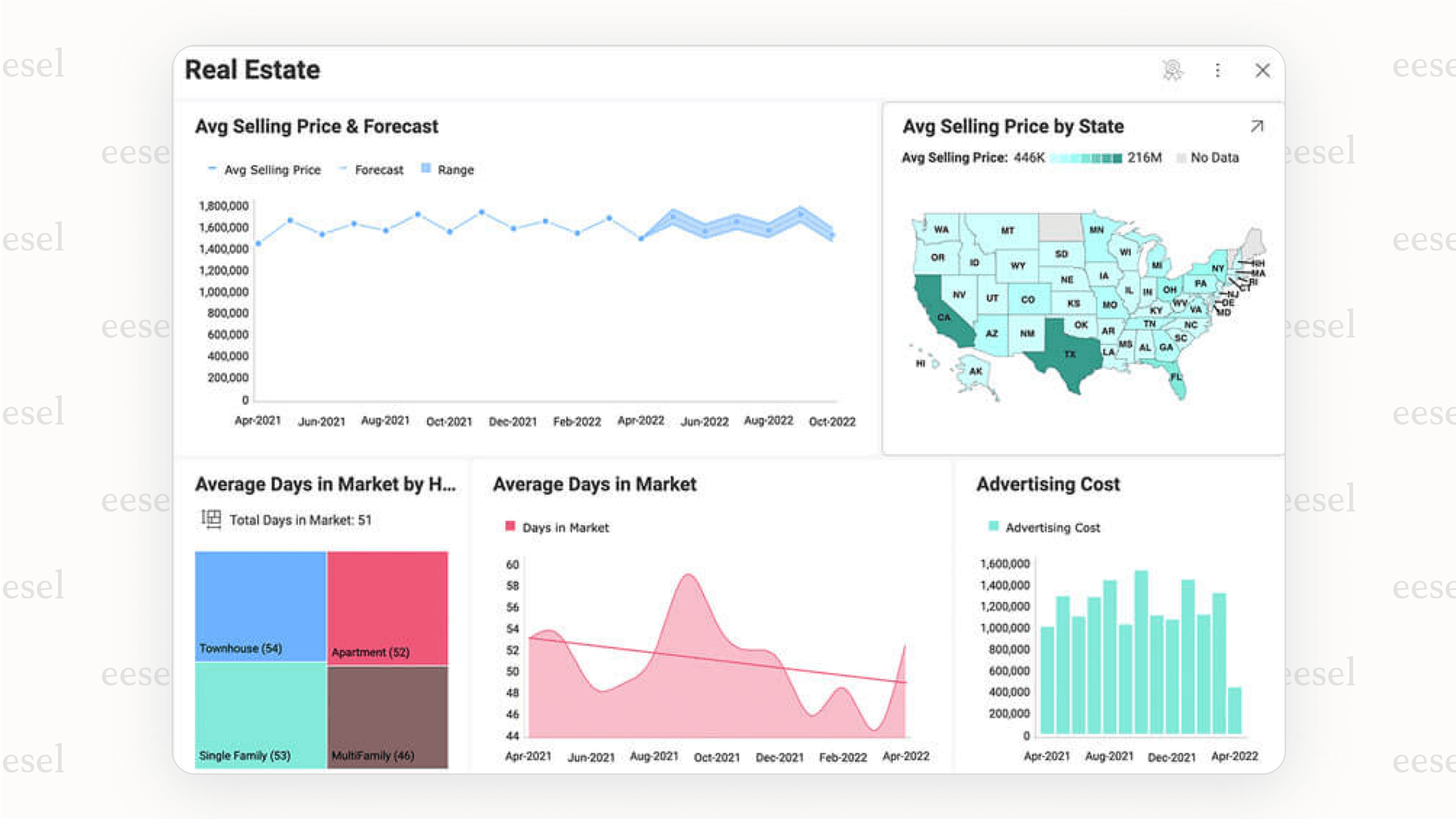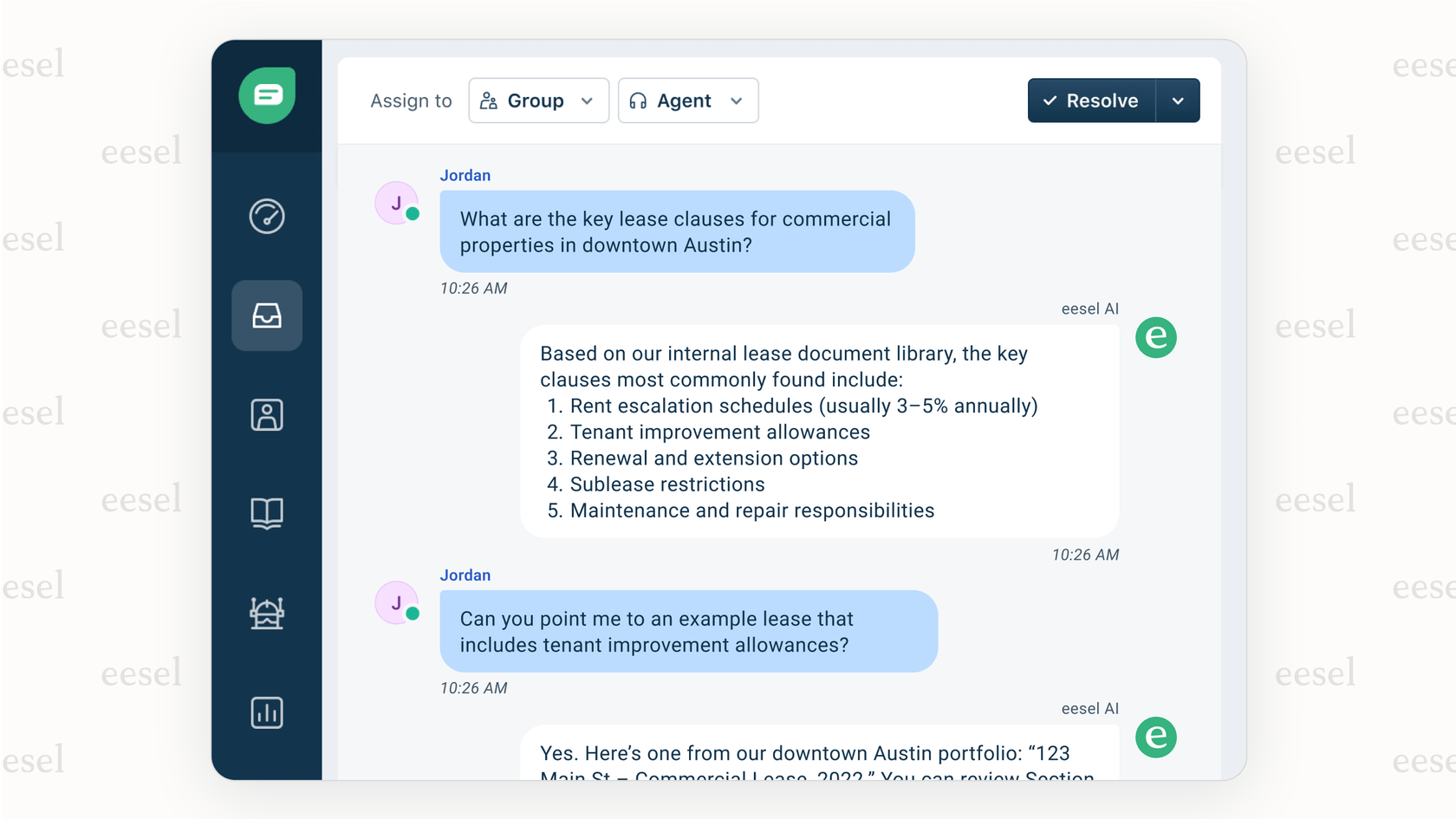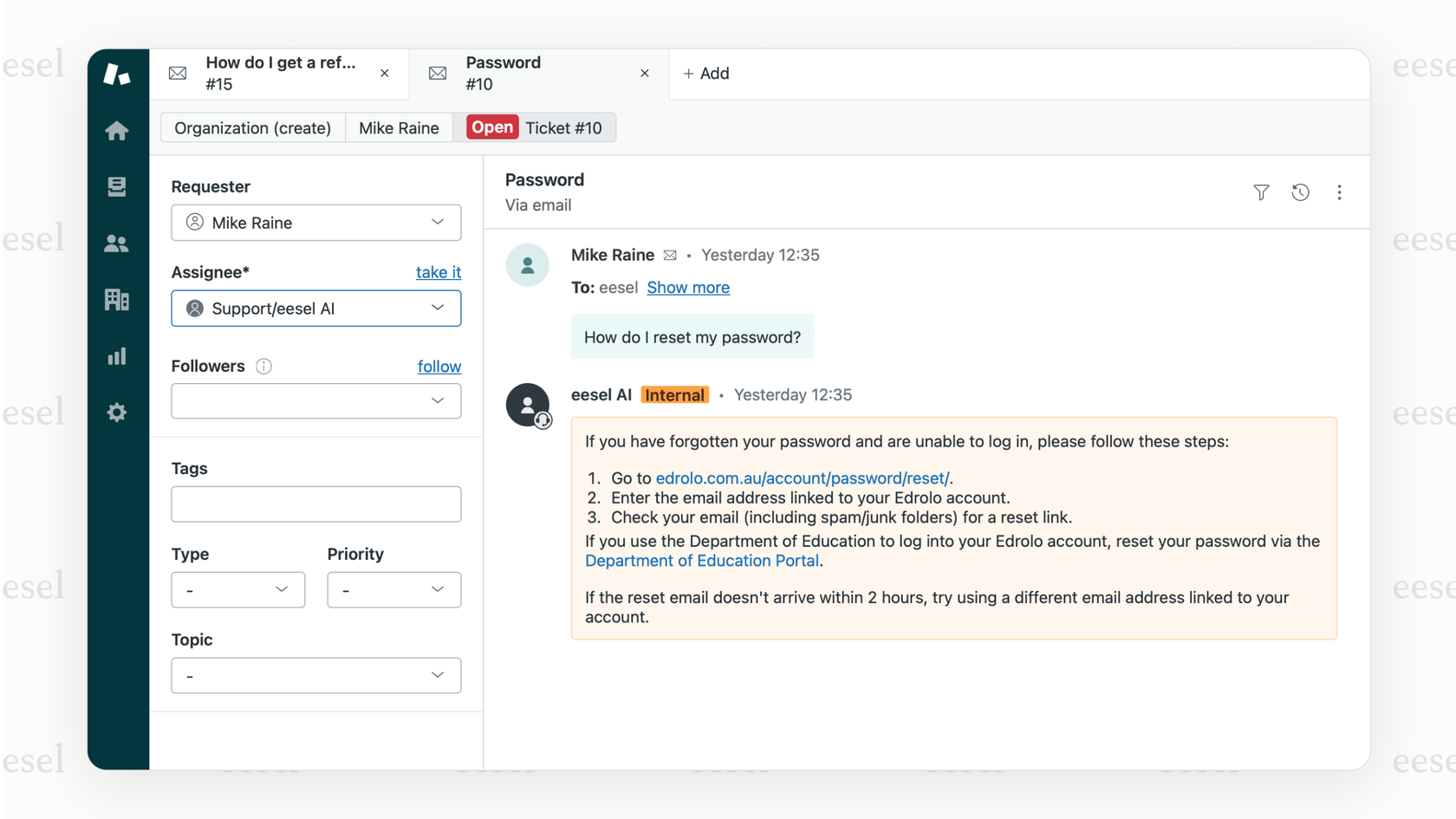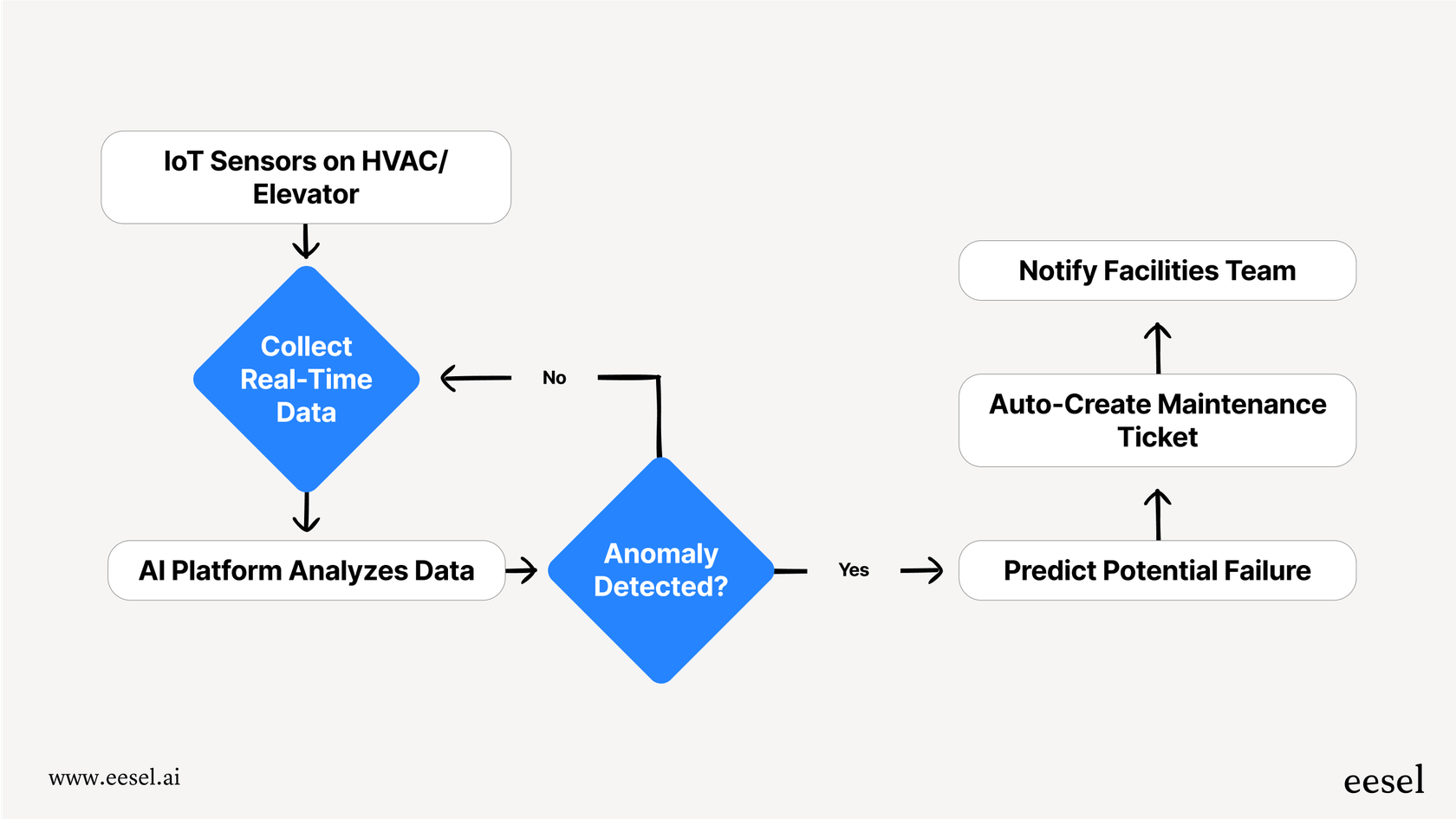
The real estate world is going through a huge digital upgrade, and AI is flooring the accelerator. Things that sounded like science fiction a few years ago, like predicting who will sell their house next or having a bot handle tenant requests, are now part of the daily grind. And it’s adding up. According to McKinsey, generative AI alone could bring up to $180 billion in value to the real estate industry.
This guide will give you a no-nonsense look at how AI for real estate is being used today in three key areas: lead generation, property valuation, and operations. We'll skip the buzzwords and show you what’s actually working for brokerages, property managers, and real estate investment trusts (REITs) so you can get a leg up on the competition.
What is AI for real estate?
AI for real estate is simply using artificial intelligence to automate, speed up, and improve tasks you’re already doing. It’s not a single magic button but a whole toolbox of different technologies working together.
Here are a few of the main types you'll encounter:
- Predictive Analytics: This is all about looking into the future. AI models comb through historical and real-time data to forecast what's next, like which homeowners in your database are most likely to sell in the next six months. Tools like Offrs have built their entire business on this idea.
- Natural Language Processing (NLP): This gives computers the ability to read and understand human language. It's the tech behind the chatbots and virtual assistants that can reply to a client’s emailed question or a tenant's text about a leaky faucet.
- Computer Vision: This technology lets AI "see" and make sense of images and videos. It’s what helps Zillow’s “Zestimate” analyze property photos to figure out a home's condition and what makes those immersive virtual property tours possible.
- Generative AI: This is the creative part of the AI family. It can whip up new content, from writing compelling property descriptions and marketing emails to brainstorming architectural designs or summarizing dense market reports. It’s a great example of what McKinsey calls the "four Cs" of gen AI: creation, concision, customer engagement, and coding.
| AI Technology | Primary Use in Real Estate | Example |
|---|---|---|
| Predictive Analytics | Forecasting sales, identifying likely sellers, market trend analysis. | A tool flags contacts in a CRM who are likely to move soon. |
| Natural Language Processing (NLP) | Automating communication with chatbots and virtual assistants. | An AI chatbot answers a potential buyer's questions on a website. |
| Computer Vision | Analyzing property photos and videos for valuation and tours. | An AVM assesses a home's condition from its listing photos. |
| Generative AI | Creating new content like property listings, emails, and reports. | AI writes a compelling marketing email for a new property. |
1. Using AI for real estate to improve lead generation and sales
Lead generation is one of the first places where AI made a big impact, helping agents and brokerages fix the endless "follow-up problem" and convert more leads into actual clients.
Automating lead qualification and follow-up with AI for real estate
Ask any agent getting leads isn't usually the hard part; it's keeping up with all of them. As one blog from Lindy.ai puts it, leads pile up, it takes longer to respond, and potential clients end up going with the first agent who gets back to them.
AI-powered chatbots and virtual assistants are a great fix for this. They offer a 24/7 first response, engaging with potential buyers and sellers the second they reach out. These bots can answer basic questions ("Can I see a virtual tour?"), ask important qualifying questions ("What’s your budget?" or "Are you pre-approved?"), and even get a showing on the calendar. Companies like Ylopo use AI assistants for text message nurturing to keep conversations warm over time.
While specialized real estate tools are good for running ads and generating leads, you often need a separate system to handle all the incoming questions. A more flexible AI platform can connect everything together. For example, eesel AI’s AI Chatbot can be placed on any real estate website to greet visitors, answer questions using your own knowledge base (like FAQs or neighborhood guides), and capture lead information. For questions that come in through email, the AI Agent can send instant, smart replies from right inside your helpdesk, making sure no opportunity slips through the cracks.
Predictive lead scoring and personalized marketing with AI for real estate
Beyond just responding to leads, AI can tell you who to respond to first. By looking at a user's behavior like the properties they view, searches they save, and emails they open AI can score each lead on how likely they are to make a move.
Tools like Revaluate are built to scan an agent's existing contact list and flag people who are suddenly showing signs they’re ready to move. This lets agents focus their time and energy on the warmest prospects instead of cold-calling their entire database. It’s not just about finding more leads; it’s about finding the right ones at the right moment.

This data also makes personalized marketing much more effective. For instance, Redfin uses AI to send out property recommendations that are so well-targeted that users often click on them more than the properties from their own saved searches.
2. A new approach to property valuation and market analysis with AI for real estate
AI is bringing more precision and speed to valuing properties and analyzing market data.
How AI for real estate powers automated valuation models (AVMs)
You've probably come across Zillow’s “Zestimate,” which is the best-known example of an Automated Valuation Model (AVM). AVMs are algorithms that estimate a property's value by crunching huge datasets, including public records, market trends, and recent sales of similar homes. They do more than just look at comps; Zillow’s model uses a neural network that can "read" listing photos to assess the quality and features of a home and include that in its valuation.

It's not just for consumers. Companies like Quantarium and HouseCanary offer very advanced AVMs for institutional investors, mortgage lenders, and REITs to help guide billion-dollar decisions.
Making sense of unstructured data with AI for real estate
While AVMs are useful, a lot of the most important information for valuation is hidden in unstructured data. We’re talking about market reports, zoning laws, long lease documents, and economic forecasts. This goldmine of information is often stuck in PDFs and internal docs, making it a pain for teams to search through and analyze.
Specialized valuation tools can't help with this, but a general AI support platform can. While eesel AI doesn't produce property valuations, its AI Internal Chat is a huge help for valuation teams and analysts. By connecting to your team’s internal knowledge sources like Confluence, Google Docs, and private databases, analysts can ask complex questions in plain English and get instant answers with sources cited.

Instead of spending hours digging through documents, an analyst can just ask, "What are the key lease clauses for commercial properties in downtown Austin?" or "Summarize the latest market report on multifamily occupancy rates." This speeds up research and due diligence, letting your experts focus on strategy instead of search bars.
3. Improving property operations and tenant support with AI for real estate
For property management companies and building operators, AI is a great way to boost efficiency and keep residents happy.
Automating tenant and resident services with AI for real estate
Property managers get flooded with the same questions over and over: "How do I pay rent?", "What are the pool hours?", "My sink is leaking, who do I call?". Answering these eats up a ton of time that could be spent on more pressing resident needs.
Conversational AI assistants, like those from EliseAI, are made to handle these chats across text, email, and even phone calls. This frees up your on-site staff to focus on the things that matter most.
This is exactly what eesel AI is built for. Property management firms can use eesel AI for Customer Service to automate frontline tenant support without leaving their current tools. The AI Agent plugs right into helpdesks like Zendesk or Freshdesk to:
- Instantly answer common tenant questions by learning from past tickets and help center articles.
- Automatically tag and route maintenance requests to the right facilities team.
- Send urgent issues to a human manager with the full conversation history attached.
- Communicate fluently in multiple languages to provide fair and consistent support for diverse communities.

The best part is that you don't have to switch away from your existing property management software or helpdesk. eesel AI works right on top of the tools you already use.
Optimizing building management and maintenance with AI for real estate
AI in real estate isn't just about software; it applies to the physical buildings, too. As Morgan Stanley reports, AI paired with Internet of Things (IoT) sensors can be used for predictive maintenance. It can flag potential problems with HVAC systems or elevators before they break down, which cuts operating costs and prevents headaches for tenants.

Pro Tip: When setting up AI for tenant support, start by running a simulation of the AI agent on your last 3-6 months of support tickets. This lets you see its potential automation rate and find any gaps in its knowledge before you turn it on. Platforms like eesel AI offer this feature to help you make the business case and get it right from the start.
Conclusion: The future of AI for real estate is augmented, not replaced
So, is AI going to take over real estate? Not at all. It's here to make the industry more data-driven and efficient. It automates the tedious follow-up that loses leads, refines valuations with deep data insights, and simplifies property operations to create a better resident experience.
The goal of AI for real estate isn't to replace agents, analysts, or property managers. It's to give them superpowers, freeing them from repetitive work so they can focus on what people do best: building relationships, thinking strategically, and closing complex deals. The businesses that come out on top will be the ones that use AI to make better use of their data and, more importantly, their people.
The right AI platform works with the tools and knowledge you already have to make that happen. eesel AI provides a suite of tools that layers over your current software to automate support for leads, tenants, and your internal teams. Book a demo to see how you can streamline your real estate operations.
Frequently asked questions
Not at all. The goal of AI is to augment your skills by handling repetitive tasks like initial lead follow-ups and data entry. This frees you up to focus on what humans do best: building client relationships, negotiating, and closing deals.
It doesn't have to be. Many modern AI tools are designed to be affordable and integrate with the software you already use. You can start with a single solution, like an AI chatbot for your website, to see an impact without a huge upfront investment.
That's a great point. AI-powered valuations are best used as a data-driven starting point, not a final answer. They are excellent for analyzing market data and comparable sales, but should always be combined with your professional expertise and on-the-ground knowledge.
The biggest immediate win is automating responses to common tenant questions about rent, hours, and maintenance. An AI assistant can handle these 24/7, freeing up your on-site team's time and ensuring residents get instant, accurate answers.
Quite the opposite. A key benefit of AI is lead qualification. AI can score leads based on their online behavior and even have initial conversations to separate the serious prospects from casual browsers, so you can focus your energy on the best opportunities.
No, you shouldn't have to. The best AI platforms are designed to work with your existing tools. They act as an intelligent layer that integrates directly into your current CRM or helpdesk, enhancing your workflow rather than disrupting it.
Share this post

Article by
Stevia Putri
Stevia Putri is a marketing generalist at eesel AI, where she helps turn powerful AI tools into stories that resonate. She’s driven by curiosity, clarity, and the human side of technology.






